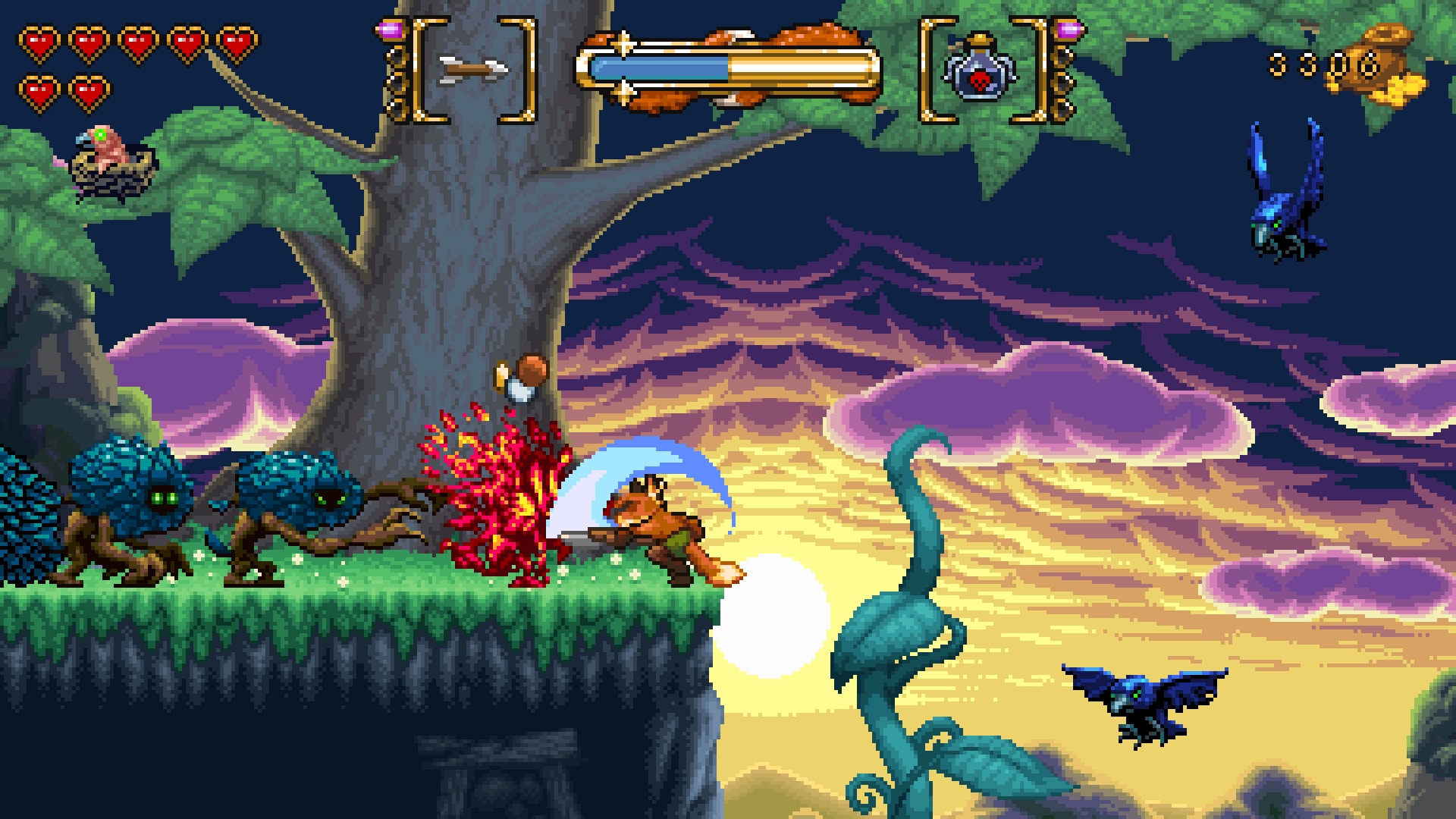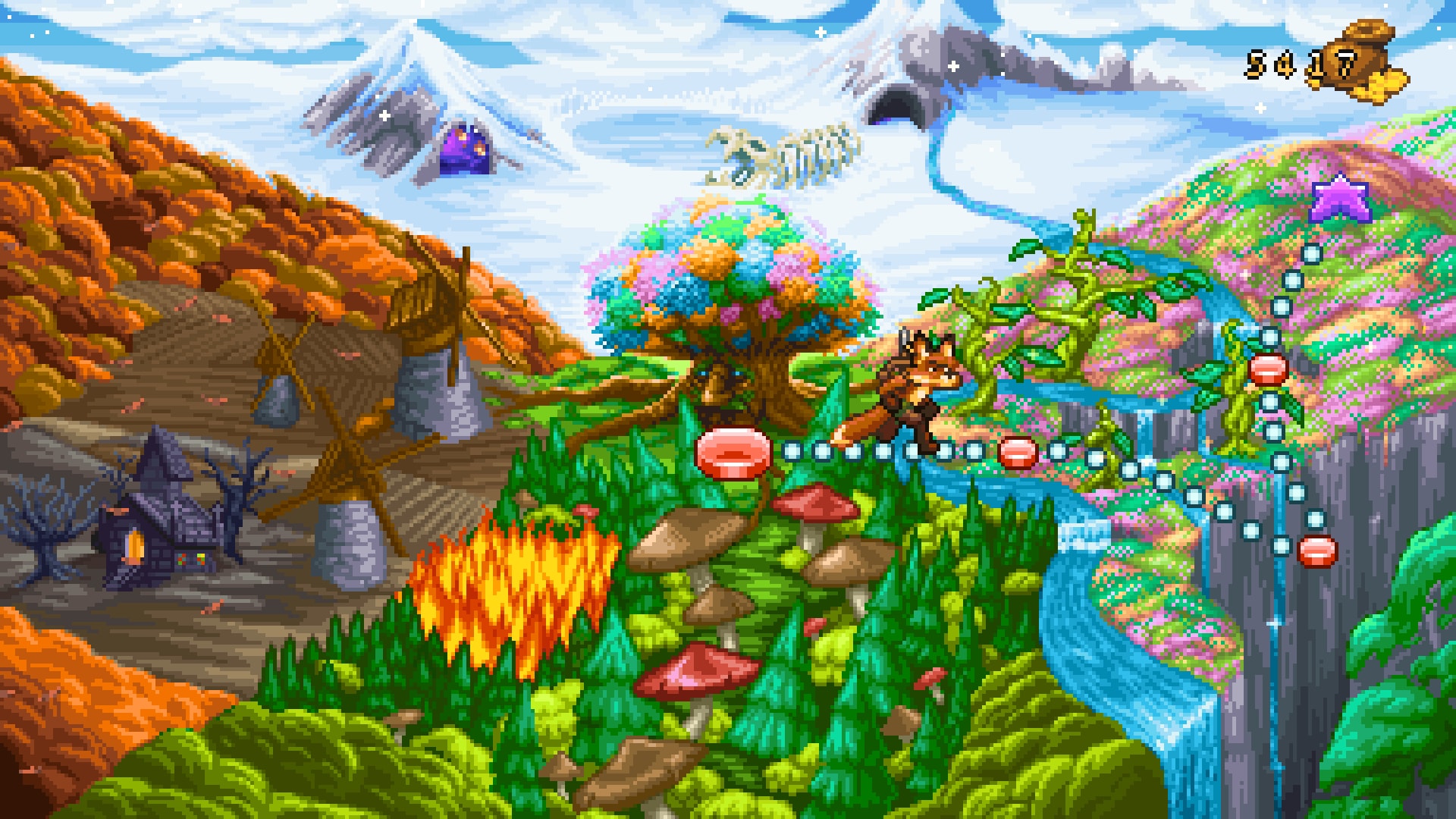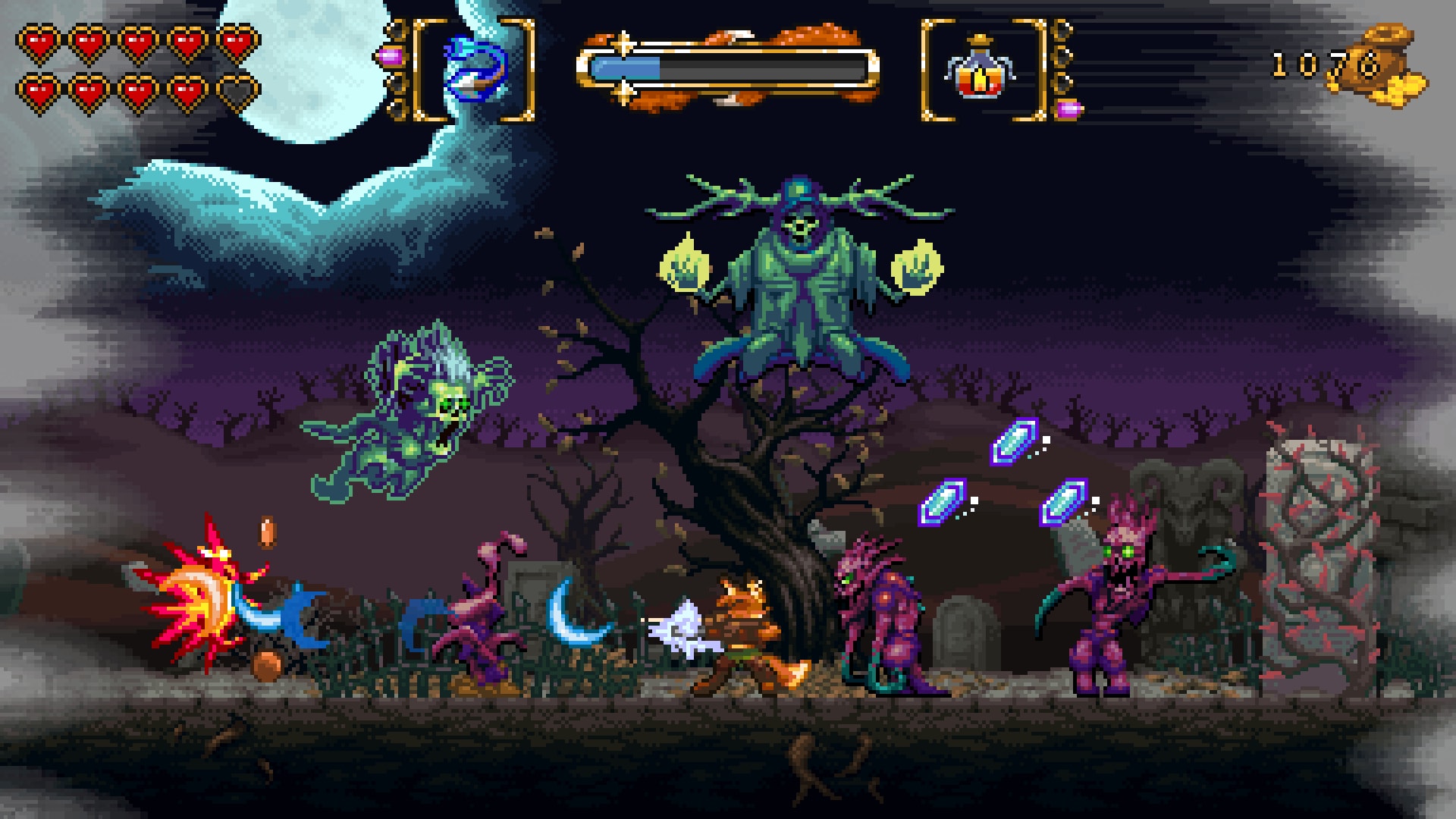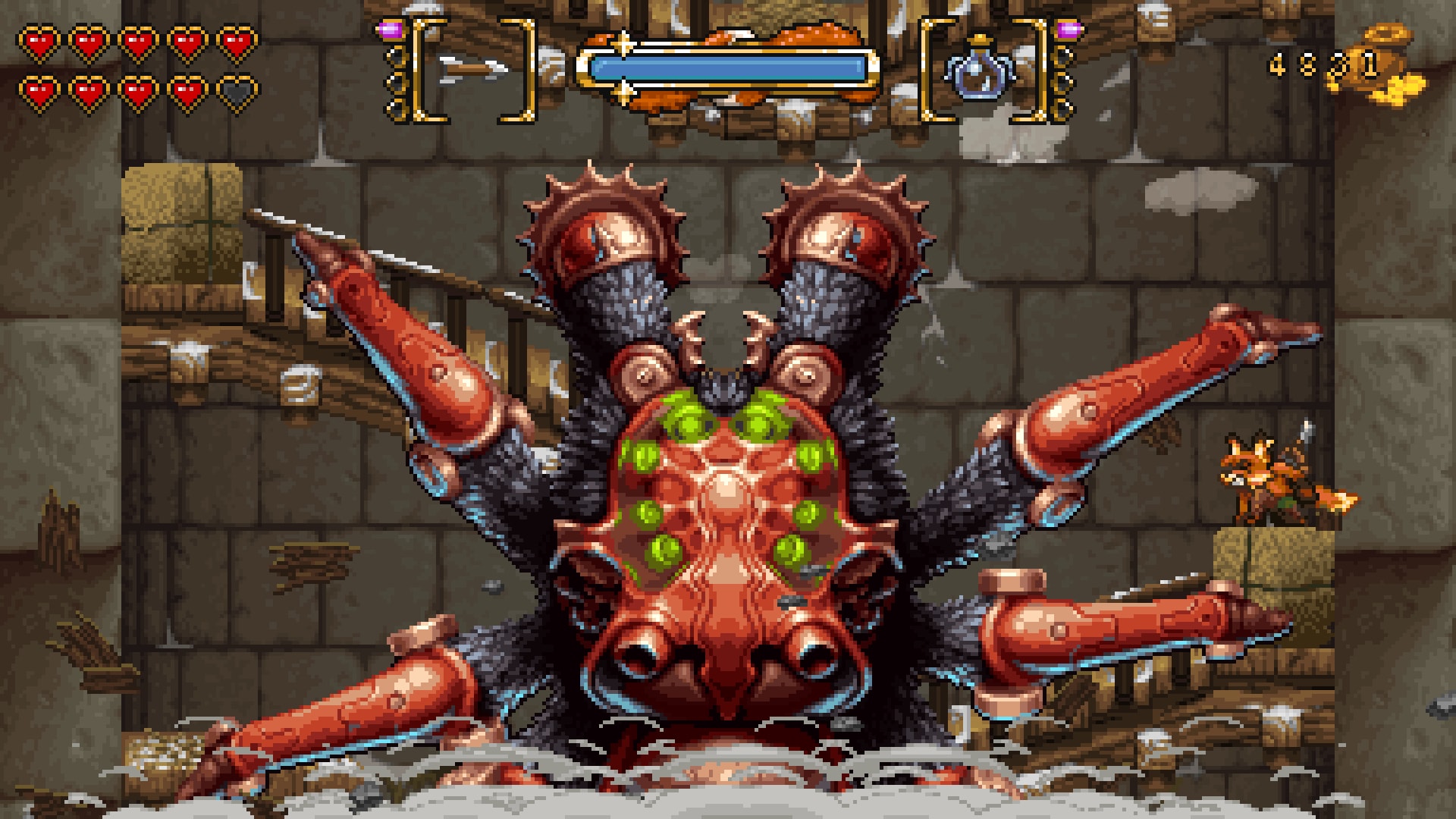Fox N Forests is a deeply authentic retro platformer
The developers explain how its 16-bit roots influenced level design, abilities, and more.

Pixel art doesn't always mean 'retro.' Sometimes it's more a matter of budget, or just a look the developers happen to love. I say this so that when I tell you Fox N Forests is a retro game you know I'm not just using it as a synonym for "it has old-fashioned graphics." This is a 16-bit platformer that deliberately harks back to a specific era. If it wasn't for the one character who makes jokes about a hedgehog getting arrested for going too fast or ET games buried in the desert—a character named Retro the Badger—you'd think this was a genuine lost Super Nintendo game somehow released on Steam in 2018.
Talking about the inspirations for its art style, game director Rupert Ochsner namechecks the likes of Super Ghouls N Ghosts, Mega Man X, and Disney's Magical Quest. "What strikes your eyes is that all these cartoony games, they have dark, very thick black outlines," he says.
Trying to recreate that look was easier said than done. "If you do the outlines 100% black then it doesn't really look high quality and it doesn't look like the sprites fit onto the backgrounds. First we had those black outlines and then we reduced them and made them almost nonexistent and then the game started to feel like more of a western Super Nintendo game, it was really interesting. And then at the end we managed to have a mix between really thick black outlines on one side but on the other side we had not so strict outlines and then you really get this Capcom Super Nintendo feel."

That wasn't the only artistic challenge they faced. The hook of Fox N Forests is a mechanic that lets you, as a crossbow-wielding fox named Rick, manipulate the seasons. Each level can be flipped between two seasons so you might go from summer to winter to put bees to sleep and freeze a lake, or from spring to fall so leaves tumble down revealing hidden platforms in a tree.
"For the artists it was a lot of work," Ochsner says, "because they had to pixel-create every tileset twice in two different seasons, because you can switch between two predefined seasons per level, and of course this is also why the levels in Fox N Forests are pretty long."
Having longer levels but less of them meant there wasn't as much need for varied tilesets, and also played into the specific kind of platformer experience they wanted to create—levels with multiple paths through them, hidden collectibles, and areas that can only be unlocked by returning with new gear.

"Something the whole team really loves about the old school 16-bit games [is] that you have to try stuff yourself, that you have to find stuff yourself," says Ochsner. That extended to new moves. "We have this cool double-jump spin attack but we do not give it to the player from the beginning. It's something you can get in the shop. It's pretty cheap so we've designed it that way, you can buy it already when you finish the first level, but once you find that yourself you go, 'Oh wow, it's such a great attack! And now it makes the whole game easier and more fun.' This is the design we had in our minds, like when you were a child, when you were playing 16-bit games, and you were really finding out stuff yourself and exploring the game your own way."
Keep up to date with the most important stories and the best deals, as picked by the PC Gamer team.
...foxes are one of the few wild animals you also get to see if you live in an urban area, especially in Europe. They have this wild magic around them but you actually get to see them.
Rupert Ochsner
It reminded me of Hollow Knight, which doesn't even give you a double jump until a fair way in, although Fox N Forests isn't quite so stingy. "I respect game designers that do this. It is a risk. Now that our game is out we sometimes see people playing it and they play half of the game without getting the double-jump spin attack. Complaining, 'Why can't you attack when you double jump?' It was a risk but what I also like is that when people are willing to engage with the game, then they are usually really happy with this design choice and they know it's really rewarding once you get it. The core community definitely likes it this way."
A similarly old school idea is that checkpoints cost coins to unlock. They're not expensive, but money spent on them could be going toward upgrading your bayonet-crossbow. In-game, the explanation is that the checkpoints are run by Retro the Badger who needs the money to fund his game-collecting habit.
"It's not a lot you have to pay Retro the Badger," Ochsner explains, "but if you take more risk you have more money at the end. We wanted to anticipate this, that if the player wants to he can take more risk, the game gets more difficult and he gets rewarded for it."

The woodland animal theme of Fox N Forests wasn't there from the start. Initially it was about a thief who was inspired by Locke from Final Fantasy 6, then a knight like Arthur from Ghosts 'n Goblins, "but knights are overdone," as Ochsner says.
"Then I was very close to making a wolf the main character and calling the game Wolf Warrior." Finally they settled on a fox, accidentally joining a string of indie games with fox protagonists like Tunic, Vulpine, and The First Tree.
"I think they're popular on one hand because of the Japanese culture and mythology where foxes are really big," says Ochsner, "and of course for gamers the Japanese culture's always a very big thing. On the other hand I think foxes are one of the few wild animals you also get to see if you live in an urban area, especially in Europe. They have this wild magic around them but you actually get to see them. They are really smart, they're very cool animals, and have adapted into urban living quite well. I think all these things come into play. Everyone has some feelings towards the fox."
Fox N Forests is available now on Steam.

Jody's first computer was a Commodore 64, so he remembers having to use a code wheel to play Pool of Radiance. A former music journalist who interviewed everyone from Giorgio Moroder to Trent Reznor, Jody also co-hosted Australia's first radio show about videogames, Zed Games. He's written for Rock Paper Shotgun, The Big Issue, GamesRadar, Zam, Glixel, Five Out of Ten Magazine, and Playboy.com, whose cheques with the bunny logo made for fun conversations at the bank. Jody's first article for PC Gamer was about the audio of Alien Isolation, published in 2015, and since then he's written about why Silent Hill belongs on PC, why Recettear: An Item Shop's Tale is the best fantasy shopkeeper tycoon game, and how weird Lost Ark can get. Jody edited PC Gamer Indie from 2017 to 2018, and he eventually lived up to his promise to play every Warhammer videogame.

